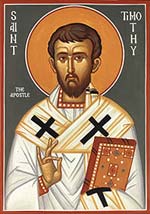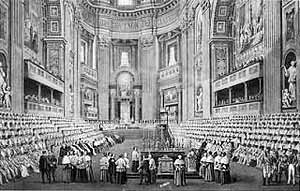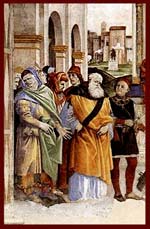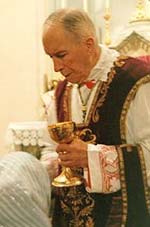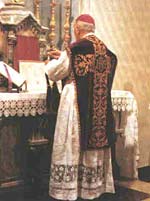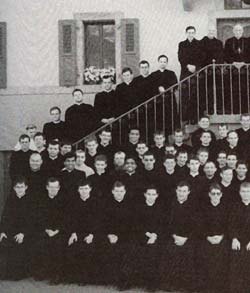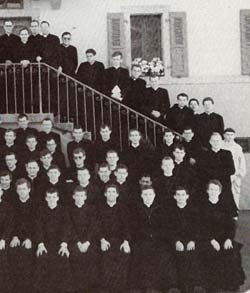|
|
This is the first sorrow of the priest: The Church’s nature has been distorted. What was the priest's ideal, what was the seminarian contemplating on entering the seminary, at least in our day? To serve the Church, to serve his Mother Church; why? Because he believed the Church to be the sole way of salvation, the only way by which souls might be saved. Then it was worth while to consecrate his life to the Church for the sake of saving souls. But if one no longer has Faith in that Church, if one believes that all religions save souls, in that case what is the good of serving the Church? Leave souls to their religion, leave to each his conscience. The sacrifice of one's self is not worth while if all religions alike ensure the salvation of souls. The nature of the Church is being distorted. The Church is no longer presented as a society necessary for Salvation. As the way necessary for Salvation. She is presented as a useful means of Salvation--a very different thing. It involves changing the very definition of the Church, and that is an extremely serious matter, for it cuts at the root of the whole missionary spirit of the Church. Why have missionaries crossed oceans, why exposed themselves to the fatal maladies of the tropics if not to save souls? If their presence is not needful for the salvation of souls but merely useful to social progress and development, to social justice and material progress; it was not for that that the priest became a priest, not for that that the missionary crosses oceans, it is to convert souls, for he is convinced that many souls are lost if they do not know Our Lord Jesus Christ. Moreover, it is not true that one can be saved through other religions. I say advisedly through other religions, not within other religions. It is untrue that one can save one's soul through other religions, one can save one's soul only through the Catholic Church, through Our Lord Jesus Christ. No other name under Heaven has been given us for our salvation. That is what Saint Peter told us: "There is no other name under Heaven than that of Our Lord Jesus Christ." It follows that there is no means other than His Church, which is His mystic Bride to whom Our Lord has given all His graces. No grace in this world, no grace in the history of humanity will be bestowed unless it be through the Church and through the Blessed Virgin Mary. Then souls cannot be saved within other religions? Yes, they may be saved. How are they saved? They are saved by the baptism of desire though unexpressed. As you know, there are three kinds of baptism: baptism of water, baptism of fire, baptism of desire. Baptism of desire may be explicit as in the case of the catechumens whom we had in Africa and of others still there--people, adults who ask to be baptized and so have the explicit desire for baptism, and who may be saved even before receiving the baptism of water. Sometimes in Africa we had fine catechumens who would say to us: "But Father, I have never been baptized. If I die now, I shall go to hell." We used to reply: "No, if you are well disposed in your heart, good, if you love God and seek to do His will, if you desire baptism, you already have the grace." Clearly, that grace will be fuller and more abundant on the day they receive baptism unless there is some obstacle such as a mortal sin to which they continue to cling. Thus there exists the baptism of explicit desire for the catechumens, and the baptism of implicit desire, which lies in the act of doing God's will. Those souls, whether Protestant, Buddhist or Moslem, who have implicitly this sincere desire to do the will of God may have the desire for baptism and so receive supernatural Grace, the Grace of eternal life, but this comes through the Church. Hence, through this implicit desire, Baptism unites them with the soul of the Church and it is through the Church, never through their religion, that they can save their souls.
In the same way as the Church is being distorted and that the priest no longer knows just why he has been ordained, so the definition of his Faith has been distorted. This is a matter which may be difficult to understand, but is yet of capital importance in Holy Church. A definition of the Faith exists, it is unalterable. Now there is an attempt at changing even the definition of the Faith. Faith is the acceptance by the intelligence of the truth revealed by the Word of God, by reason of the authority of God who reveals it. We believe a truth coming to us from outside, from the Word of God, a truth which must be believed because of the authority of God who reveals. That is the definition of Faith. What is being done to Faith now? It has become an inner feeling. That is the modernist definition of Faith condemned by Pope Saint Pius X. Faith is not a personal feeling, it is not something purely subjective, adhesion of the soul to God each on his own account, each following his individual conscience--that is not the Faith. It is precisely this conception which altogether destroys all the authority of God, all the authority of the Church. Since, however, the Faith comes to us from without we must submit to it; all are bound to submit to it. "He who believes shall be saved, but he who does not believe shall be condemned." It was Our Lord who said that. The Faith is altogether imposed, it is imposed on us from without, it is not a purely personal feeling, affection for God, a sentiment for the deity. Now, that is just what, the modernists thought, what unhappily many are thinking today, who are beginning to transform the concept of Faith. It provided some explanation of the idea that all religions save, because each has a Faith according to his individual conscience, and all faiths save. Consciences vary, one believes after this manner, another after another. It matters little, provided the conscience is directed towards God and is united with God. It is utterly Untrue. Look that is exactly what the anti-modernist oath which was taken by all the older priests here this evening tells us. Moreover, we read it during the Council: "I hold it as a certainty and sincerely profess that the Faith is not a blind religious sentiment emerging from the darkness of the subconscious under the pressure of the heart and the desire of the morally animated will, but that it is a true assent of the intelligence to the truth received from without by which we believe rightly through the authority of God, the Sovereign Truth." That is the meaning of Faith and it is wholly different. It would be well to reiterate these things, we are forgetting them. Unfortunately, I must present you with a document published in recent weeks by the official Catechetics Commission of the French episcopacy from its headquarters in the office of the Archbishopric of Paris. This is what those persons have to say on the subject of Faith. Believe me I am not making it up, merely reading it aloud. First, on the subject of Truth: "Truth is not something received ready-made, but something in the making." Truth, then, is something in the making like something in the process of creation. Man does not receive the truth, he builds it up. Look at the complete difference in outlook. To receive the Truth of God, of the Word of God, of the Church, of the magisterium of the Church is one thing. Something which has always been stated. We have received our catechism and have studied it as something Coming to us from God. We believe in it because it is the authority of God which reveals it. But truth is not self-creating, it does not create itself from the subconscious, from ourselves; it is not we who create truth. This is terrible, is it not? Such questions are serious, very serious. From all this there follow consequences very important to our Faith, for example; "For we shall then perceive that it is something very different from an intellectual adhesion or belief in the things believed, but rather an actual and active life of relations between God and Man." It is no longer the Faith, it is the Modernist Faith. I infinitely regret that these should be documents issuing from Official Commissions of the episcopate. I deplore it. You have heard what I have just read you about the Faith which has always been taught us and this is what is said in these documents! It is deeply regrettable! Either we believe or we do not believe. We either believe in the authority of God, or we do not. It is the same for the dogma of our salvation. This is the entry on salvation: "Salvation--two catechetical schemata." Salvation--Redemption--that is the traditional salvation and here is the traditional entry: "We have lost the Grace of God, but Christ has redeemed us by His cross and has entrusted to His Church the means of salvation." Good--that is indeed what we have always been taught, that it is the Church which saves us. "Let us hope that other men may be saved likewise.” Let us hope and pray, and one might have added--and let us pray that, in order that other men too may find salvation, there may be vocations to set out to save them," whence comes the missionary spirit of the Church. There follows a new schema contrary to the former which speaks of Salvation--Covenant. "The future of humanity." Of humanity. We are already somewhat bewildered. What exactly does that mean? "The future of humanity is union with God, sealed by Jesus on Easter day; while we still knew not God, the community of believers answers for it in History." This is what the author of the schema has to say: "These two schemata seek to embrace the general outlines of two concepts of salvation. They are deliberately summary so that they may not be regarded as creeds embodying all the essentials. Let us say once again--only schemata are in question and the catechist may be assured of the suitability for our times of a presentation of salvation akin to that of the second schema; all the same he should beware of despising those who recognize themselves in the first schema." It is a very serious matter. We are given a schema on salvation which is no longer, that taught by the Church for two thousand years. Vague terms: "the future of humanity," "union with God," what do these mean? We have been told of the Truth which is self-creating, which grows within us. Once again we find all the modernist errors condemned by Pope Pius X. I am sorry to be obliged to record the fact, but record it we must. We must not be afraid to affirm it, because little by little we shall become Protestants and modernists. Without a shadow of doubt we shall be slowly but surely poisoned. Ultimately, we shall come to find ourselves, as the majority of the faithful and the bishops found themselves to be Arians in the time of Arianism--without being aware of it, we shall find ourselves Protestants and modernists.
The second sorrow of the priest: He is deprived of his very raison d'être. What, in all religions, is the real raison d'être of the priest? Priest and sacrifice--the two ideas are absolutely essential and inseparably linked. There is no sacrifice without a priest, there is no priest without a sacrifice. The idea of the priest is meaningless apart from sacrifice--the idea of sacrifice cannot be understood apart from the priest. This is true of all religions, most especially our holy Religion. It was God himself who was concerned to give us this sacrifice, to put it into our hands and institute a special sacrament which confers a character on the priest, a character which associates him with and gives him a share in the Priesthood of Our Lord to offer the Sacrifice. The unique Sacrifice of the Cross is still made on our altars. It is the same Priest, the same Victim who offers Himself on our altars. Our Lord is the true Priest--We ourselves are but priest-instruments, who have received this character. We are but instruments of the one Priest who is Our Lord to offer the one Victim who is also Our Lord, present on the altar. You can
see the importance of preserving these fundamental ideas. What
does the seminarian regard as the most beautiful of all things--the
call to mount the steps to the altar. Throughout our time in the
seminary we lived for that--to go from minor orders to become
sub-deacons, then deacons. Soon I shall ascend the steps of the
altar, I shall offer the Body and Blood of Our Lord. By pronouncing
the words of consecration I can bring God down upon the altar
as, by her Fiat, the Virgin Mary brought down her Son into her
womb. I shall have the same power as the most holy Virgin Mary
when she uttered her Fiat. When we ourselves speak the words of
consecration, Jesus comes down from heaven under the species of
Bread and Wine. It is a miraculous, unbelievable honor for such
poor creatures as we. Then it is worth while to be a priest to
go up to the altar, to offer the Divine Sacrifice, to continue
the Sacrifice of the Cross. That is the liturgy. That is the Mass.
To give Holy Communion--what can a priest do better than give
Holy Communion? There is nothing better he can do than give Our
Lord Jesus Christ, present in the Eucharist. Therein lies the
very reason for his celibacy. We need seek no further. It is often
said that a priest's celibacy is for the furtherance of his ministry.
The priest is overburdened by the cares of his ministry. Night
and day he must hold himself at the disposal of the faithful.
Therefore he should be a celibate and a virgin. But it is not
only that. If that were all the doctors here could say the same.
They too are called out night and day. They too work all day long
if they would fain devote themselves to their patients. Probably
they have even less time than the priest. The same is doubtless
true of many other people here who come from different walks of
life. There is something else that is the greatness of his priesthood.
That is his intimate nearness to God. It comes essentially through
the power conferred on him to speak the words of consecration
and bring Our Lord down upon the altar. That is the inmost reason
for the priest's virginity. Just as it is meet and right that
the Virgin should have been a virgin because she was so closely
linked with the mystery of the Trinity and the mystery of the
Incarnation, it was fitting that she should be a virgin. Well!
The same is true of the priest who is so closely bound to God,
so near God, so near Our Lord Jesus Christ that it is fitting
that he too should give his whole life and all his activity for
God.
If the priesthood is thus defined the true value of the priestly vocation is understandable. On the other hand, if the sacrifice of the Mass is being slowly but surely distorted to make it no more than a meal, just a meal in memory of the Last Supper, it is no longer worthwhile to be a priest. It is not worthwhile because the president of an assembly can preside at a memorial meal. Indeed, we need do no more than delegate one of us to be responsible for this memorial. There is no more need of the sacerdotal character since there is no more sacrifice. In that case the real presence is no longer necessary either. Why is the real presence of Our Lord necessary? Precisely because the victim must be offered. If there is to be a sacrifice the victim must necessarily be present. But if there is no longer a sacrifice there is no more need of a victim. If there is no longer a victim, there is no longer need of the real presence of Our Lord, a spiritual presence is amply sufficient. If the sacrifice is changed into a meal, we have adopted protestant thinking in its entirety. So much must be admitted--the facts are there yet again. I am not inventing anything; I will give you a few examples. Here, for example, is the little booklet on Masses for small or individual groups issued by the Conference of Swiss Bishops and the Swiss Commission on the Liturgy. This is how it speaks of the Mass: "The Lord's Supper brings about, above all, communion with Christ. It is the same communion as that effected by Jesus during His earthly life when he sat down to table with sinners, a communion continued since the day of the Resurrection in the Eucharistic meal. The Lord invites His friends to gather together and He will be among them.” No! That is not the Mass. That meal to which Our Lord invites us, promising to be in our midst as in that far-off meal in Palestine, is not the Mass. No, we are sharing in His Body and His Blood present on the holy altar and we are offering, them. Our Lord offers Himself to God as a victim for the salvation of souls and it is thus that the Redemption continues, that the expiation for our sins continues. For, if there is no longer a Sacrifice, if blood is no longer shed, there is no more remission of sins. A simple memorial does not suffice for the remission of sins. Here are other examples in plenty. Take for example the Strasbourg Evening School of Theology:"We must realize today that we are faced with a real cultural mutation. A particular manner of celebrating the memorial of the Lord was bound up with a religious universe which is no longer ours." In the light of this, it is obvious that the definition of the Mass has entirely changed. This idea of change, that today we are utterly different, that we no longer have a single idea resembling those of our forbears is surely an absurdity. Are we really men wholly different from those born a hundred years ago? We are surfeited with having the idea dinned into us with intent to change our Faith. If all things change, if the World changes, if humanity changes, if conditions change as claimed here: "The memorial to Our Lord has been bound up with a religious universe which is no longer ours"--it is quickly said, and everything disappears: "a religious universe which is no longer ours." So we must begin from zero. Begin, and we come to what the dean of the Faculty of Theology at Strasbourg says concerning Our Lord's real presence, "In the same way we speak of the presence of an orator or of an actor, thereby implying a quality other than a simple topographical 'being there.' To sum up, someone may be present by virtue of a symbolic action which he does not perform physically, but which others accomplish by faithful interpretation of his most deep-seated intention. For example, the Bayreuth Festival doubtless realizes a presence of Richard Wagner superior in intensity to what is shown in works or occasional concerts dedicated to the musician. It is in such a perspective, I believe, that he should regard the Eucharistic presence of Christ." An author's play is staged and the writer's presence likened to the presence of Our Lord in the Eucharist. Well! A dean of the Faculty of Theology in the University of Strasbourg! How can you expect seminarians listening to that sort of stuff to keep the Faith--I did not invent this; I am inventing nothing. Here is
another document from the Centre Jean-Bart, official centre of
the Archbishopric of Paris; there are incredible statements. "Christ's
Eucharist Today" (Dated 17th March 1973). "Is
not the Mass Our Lord's Supper, an invitation to Communion?"
There is no more mention of sacrifice. Then: "At
the heart of the Mass lies a story"--There is a story.
The same thing is stated in the Swiss Bishops' little booklet.
"There lies a story." No, it is not a story. The
Canon is not a story. Look at old missals. Above "Communicantes"
you will see Infra actionem. Out of curiosity, look at
your missals. "Infra actionem,” during the
action. What does that mean? It means that the priest performs
an act, a sacrificial act. Transubstantiation is an act, the sacrifice
is an act, not merely a narration. That is why the priest bends
forward and prepares himself for that wonderful action which finds
its consummation at the moment when Our Lord will be present on
the holy altar. It is at that moment that Our Lord offers Himself
anew to His Father and expiates our sins. It is an act, not a
narration. "Now, at the heart of the Mass--there is a
story." No, it is not a story. "What we are
celebrating then is a memorial of our redemption. Memorial: a
word which it is essential to understand. It is not a question
of commemorating a past event, as though meeting simply in remembrance.
Neither is it a question of the renewal of that event. Christ
died and rose again once and forever--that can never happen again."
"Can never happen again." Is not Our Lord able
to perform a miracle and repeat for us His sacrifice on Calvary?
They would seem to say that it is impossible. The sacrifice on
Calvary took place once and forever. That is utterly false, the
sacrifice of Calvary is really there, bloodlessly renewed on the
altar. That is the only way in which it differs from the sacrifice
on Calvary. In the one, Our Lord offered Himself in a bloody manner,
in the other He offers Himself in an un-bloody manner on our altars.
But His Blood is present, His Body is present. If one no longer
believes that, one no longer believes in anything in Holy Church.
For it is all there, all Christian spirituality is contained in
the sacrifice of the Mass. We must never forget that. Perhaps
there has been too much talk of the Eucharist, Communion, and
not enough of the Sacrifice of the Mass. I believe we should go
back to the fundamental ideas, to that fundamental idea which
has been that of the whole tradition of the Church, the Sacrifice
of the Mass which is the heart of the Church. Communion is but
the fruit, the fruit of the sacrifice. The communion of the faithful,
communion with the Victim, which offers itself and is offered.
We must go back to these essential principles.
Firstly, if we abandon those essential principles there is no longer any reason for the priesthood. For the priest, if he no longer has his sacrifice to offer, has no more reason for existence. There is no reason for being a religious. Why? What is a religious? A religious is a person who offers his whole life and all he does in union with the Victim who offers Himself on the altar. The best proof is that whenever one makes his solemn profession, whenever there is a profession, or a renewal of profession, it is always at the altar. It is always in union with the Holy Victim and it is that which is the joy and consolation of both monks and nuns, the knowledge that publicly and officially, within the Church and received by the Church, they have offered themselves completely and for all their lives with the Victim who offers Himself on the altar. If there is no longer a Victim offering Himself on the altar, there is no longer any reason for being a monk or a nun. For you too, faithful Christians, it is the meaning of your Christian life. What is the meaning of your life? What is the meaning of your baptism? It is the offering of yourselves, the offering of your whole lives, wholly, with Our Lord Jesus Christ as the Victim on the altar. That is the consolation of your lives. It is that which has power to sustain you in your trials. Go into the hospitals and talk with the dying, with those preparing to meet death. Unless you speak to them of the sacrifice of Our Lord, unless you unite their sacrifice with that of Our Lord, you may talk of what you please, they will not understand. But speak to them rather of Our Lord offering Himself on the Cross, on the altars. Say to them: "Unite your suffering and your pain with those of Our Lord Jesus Christ and, at one and the same time, you will save your soul and those of others." Then the sick will understand that suffering is worthwhile. Among those who have been in prison and in concentration camps how many have returned to the Faith when they thought they were suffering and were offering themselves with the Victim who offers Himself on the altar. You see, if that is not so, if there is no cross in our lives, if there is no longer the sacrifice of the cross and the sacrifice of the altar, there is nothing left in our Christian lives, it is finished. That is of the utmost importance: in some way all Christian spirituality hangs upon the sacrifice of the altar. We have no right then, to say that Holy Mass is only a meal. Well, we must look things in the face. Our altar of sacrifice, a stone altar, a massive altar on which to offer the sacrifice has been transformed into a table, a mere dining table. In many cases, the relics of martyrs preserved within the altar stones have been removed. At least there was an altar stone which actually represented the stone of sacrifice since the sacrifice is offered on an altar of stone. And the relics of martyrs, why the relics of martyrs? Because they offered their blood for Our Lord Jesus Christ. Is not this communion of the Blood of Our Lord with the blood of the martyrs an admirable evocation encouraging us to offer our lives with Our Lord's as did the martyrs? But now the relics of the martyrs are removed. If the Mass is a meal it is easy to understand the priest's turning towards the faithful. One does not turn ones back on ones guests at a meal. If, however, it is a sacrifice, the sacrifice is offered to God, not to the faithful. Hence it is understandable that the priest should be at the head of the faithful and turn towards God, towards the crucifix, he is offering the sacrifice to God. When, for their instruction, he must speak to the people, it is natural that he should turn to the faithful. So soon, however, as he speaks to God, it is he who acts, from the moment of the Offertory it is he who, with his priestly character, goes into action--it is not the faithful. There too there is a confused notion. The priesthood of the faithful is being confused with that of the priest. The priesthood of the priest is essentially different from that of the faithful. That was stated by the cardinals in their commentaries on the Dutch Catechism. They required the Dutch Catechism to go back to that notion: the ministerial priesthood. There are ten points on which they asked the makers of the Dutch Catechism to alter the text. Nothing at all has been changed. The Committee of Cardinals' statement on the new catechism was printed at the back of the edition, but it very soon disappeared. Now the Dutch Catechisms have been translated into all languages and there is no sign of the emendations made and required by the Cardinals, emendations on capital points, points fundamental to our Faith. "Beware of diminishing the greatness of the ministerial priesthood which, by its sharing in the priesthood of Christ, differs from the general priesthood of the faithful not only in degree but in essentials." That is what the Cardinals say. Now, it must not be forgotten that most catechisms have been compiled under the influence of the Dutch catechism, the new catechism. There are many more serious matters that we have no right to minimize. If there is a tendency to regard the sacrifice of the Mass as a meal, it is natural to take communion in the hand. If it is a meal, it is a morsel of bread which is distributed, a memento, a memorial. But when we know that Our Lord is present! When we know who Our Lord is! We cannot indeed know, we have no means of telling! Reflect that all the angels of heaven bow before Our Lord, that at the very Name of Jesus every knee is bent whether in heaven, on earth, or in hell. Yet we, we are afraid to kneel in the presence of Him whose name, if it be but spoken on the Day of Judgment will bring to their knees all humanity, all the souls in heaven, all the angels and all those in hell. We should think of these things. Lastly, a final wound is inflicted on the priest: His catechism is taken from him. As I have just spoken of this I will not stress the matter. But the catechism has been transformed and it has been done under the inspiration of the Dutch catechism. Not long ago I read in an investigation carried out by the Pélerin a questionnaire addressed to mothers of families. They were asked what they thought of the new catechism and of the new methods and of the new teaching given to their children. Well! I believe I am not mistaken in saying that for every nine or ten replies sent in only two were at all favorable to the new method and the new catechism. All the other replies from mothers were unfavorable. "We find," they said, "that our children no longer know anything. They no longer know even their prayers, they do not know how to make their confession, they remember nothing." That is the considered opinion given to the Pélerin by mothers of families. It is a serious matter. Now such complaints are reaching us daily. It was once my intention to give my seminarians a year of spiritual training before entering the seminary, a full year of spiritual preparation as it might have been conceived in the past that is asceticism and mysticism. We would speak to them of the virtues, of the gifts of the spirit, of the beatitudes and kindred subjects such as the presence in them of the Holy Spirit and supernatural grace. We discovered, however, that they no longer have any knowledge of fundamental concepts. We finally decided that it would be essential to give these young men who have come here with intent to become priests and the longing to become true priests a straightforward course on the catechism during their year of spiritual preparation. We had to do a revision of everything. All our ideas have had to be reconsidered. It is unthinkably, inconceivably serious. Do we realize or not that our Faith is Eternal Life? During the rite of baptism, when the priest baptizes, he asks the godfather: "What does Faith bring you? Faith brings you Eternal Life." Has Eternal Life meaning for us? Or does it mean nothing? If Faith truly brings us Eternal Life we have no right to lessen the meaning of our Faith with a “Well, well” or “We are told we should do that”. We have been told that we must think on these lines. What would you have me do--I do not understand the matter. "You have no right to speak in that way. You were brought up in the Faith. One has no right to change the Faith. Saint Paul himself said "If an angel from heaven preach any other gospel unto you than that which we have preached do not hearken." That is what St. Paul said to the faithful. Let me say yet again that I am not defending my personal ideas but the whole tradition of the Church. We have no right to minimize our catechism. We must return to our age--old catechisms. We must. Otherwise our children will know nothing, and they will lose the Faith. We have no right to let our children abandon the Catholic Faith. We must teach them the true catechism.
|
|||||||||||||||||||||||||||||

